






















Use the QR code to join to get help at work and save money

RMT has developed a number of benefits to save members money. This includes negotiating access to savings and special offers from our approved partners.
The union has a dedicated team of elected officers and local reps to serve your interests negotiating with employers on issues from pay, hours of work, pensions and working conditions. They are supported by a team of researchers to formulate pay claims to obtain the best negotiated terms for you.
The union has a political fund to run campaigns and provide a political voice to benefit members’ interests in the workplace. RMT has a very active parliamentary group which raises issues of concern for members at Westminster, the Scottish Parliament and Welsh Assembly.
Personal injury claims cover if you suffer an accident in work or outside work. RMT underwrites settlements that would not be provided by no-win, no-fee companies. Call 08457 125 495.
Members who have suffered an industrial disease will receive free legal support to make a claim. Such claims are underwritten by the union and members will not have any deduction from their settlement unlike claims run by no-win, no-fee companies. Call 08457 125 495
Should a member find themselves unfairly
dismissed, discriminated against or have any claim which has reasonable prospects of success at an Employment Tribunal, RMT will provide legal representation and pay the fee. Even if the union is advised that the claim is unlikely to succeed, members who make a claim are eligible to receive free legal advice.
Payable if you have an accident at work or on the way to or from work. Accident benefit is only payable if you have been off for three days or more. Accident must be reported to branch secretary within 26 weeks in order to qualify for accident benefit.
Payable to any member who retires over the age of 60 or aged 55 if retired through redundancy or resettlement. Ill health retirement is also payable; proof of this must be sent with application for retirement benefit.
The union can provide a personal taxation service and will preparation service.
Payable to any member who is experiencing loss of wages through being permanently demoted or downgraded as a result of illness or injury.
Payment of £300 provided that member reports this to branch secretary within 12 weeks.
The beneficiaries of this fund would be any child of a member or spouse if the member dies in service or if a members’ spouse dies and the member has responsibility of the children. Benefit is paid while a child is in full-time education up until the age of 22. Payment is made quarterly and the rate is £12.00 per week for children up to the age of 16, then £12.75 per week from 16 to 22.
Accessible savings and affordable loans from RMT’s Credit union. www.rmt.org.uk/about/credit -union
Shop online with RMTrewards.com and earn cashback savings from hundreds of retailers, like B&Q, Argos and Tesco. It’s free to join, plus you’ll get a FREE £10 Welcome Bonus in your online account! (Terms and conditions apply) www.rmtrewards.com
if you drive a company vehicle as part of your job you can join the RMT fines pool for £7 per year. The Fines Pool will reimburse members for any speeding fines, related court costs and lost time to attend a court hearing. www.rmt.org.uk/memberbenefits/fines-pool
A Death Grant of £600 is payable to the nearest relative or legal representative if a member dies through any cause prior to retirement.
Fancy cashback on your everyday shopping? Use your RMT Prepaid Plus Cashback card at over 50 partner retailers, including Sainsbury’s, ASDA and Boots, and earn unlimited cashback! It’s different to a credit or debit card - you can only spend what you load so there’s less chance of getting carried away. www.rmtprepaid.com
As a benefit of your RMT membership you can register for £5,000 Free Accidental Death Cover. Cover is for UK residents aged 18-69.12 months free cover.
Annually renewable and always FREE. This policy is underwritten by Stonebridge International Insurance Ltd. www.rmtprotect.com
For a small monthly premium you can claim cash-back on dental, optical and therapy treatments. Visit www.bhsf.co.uk
Assistance for members with their potential employment tribunal claim offered through the RMT’s In-house Legal Department.
Page 5
Page 6
Page 7
AVANTI WEST COAST CATERERS STRIKE
Page 8 THE GREAT RAIL RESET
Page 10 YOUR UNION, YOUR VOICE
Page 11
KEEP THE POLITICAL FUND
Page 12
Page
Page 19
ORGANISING CLEANERS
Page 20 WINNING AT WORK
Page 22
VIVA CUBA!
Page 23
PRESIDENT’S COLUMN
Page 24
CROWN ESTATE PROFITS MUST BENEFIT OFFSHORE WORKERS
Page 25 FIGHTING APARTHEID
Page 26
EAST KENT HERITAGE
Page 28 THE PHILIPPINES: THE DIRTY WAR AGAINST TRADE UNIONS
Page 29
ORGANISING ON THE MEDWAY
Page 30
LETTERS / CROSSWORD

RMT News goes to press your union has finally received proposals from the Department of Transport for a no strings attached pay offer to settle the long running dispute with train operating companies.
RMT is also in talks with Network Rail for a decent settlement as well as with the Ministry of Defence on behalf of Royal Fleet Auxiliary (RFA) members who have taken further strike action around the world against low pay.
Your union is also seeking to address pressing issues facing bus members at First South West particularly on low pay after members across Cornwall and Somerset took solid strike action over the summer.
The slow pace of finding acceptable settlements for all these long running disputes has been a source of frustration for all of us but your union remains determined to seek improvements for members across all grades and sectors.
RMT is currently holding a ballot to keep the union’s Political Fund because the law states that to run political campaigns trade unions must ballot members every ten years to allow us to keep doing so.
That is why you must vote to ensure that your union can campaign for more rights at
work, improved health and safety, better pay with reduced hours, defend jobs and conditions and to protect pensions. The Political Fund is your voice at work so vote to keep it before the October 21 deadline.
The union has welcomed plans by the Labour government to remove years of Tory anti-union laws which have only succeeded in heightening the likelihood of strike action and worsened industrial relations.
The anti-union laws set to be scrapped included requirements for higher thresholds for strike action and the ludicrous and unworkable Strikes (Minimum Service Levels) Act 2023 which would have forced about 40 per cent of rail services to run on strike days.
Congratulations to RMT members working under the Offshore Diving Industry Agreement (ODIA) for winning a substantial pay increase after voting overwhelmingly in favour of strike action.
This victory shows just what can be achieved when unity is developed and maintained in the workplace, where it matters.


RMT’s young members advisory committee (YMAC) has developed a campaign to organise apprentices in the transport sector.
The campaign began following a decision from the union’s annual general meeting to adopt YMAC’s resolution on developing a new approach to organising trainees with the four clear demands: better terms and conditions, an end to fixed term contracts, an end to the outsourcing of apprentice education and more skilled apprenticeships in the transport industry.
In recent years, the rail industry, in particular, has seen apprenticeships become a way for employers to use trainees to replace full-time employees and with less hope of gaining secure full-time employment with the introduction of fixed term contracts including within major companies such as Transport for London.
As a result, the young members’ committee has done a lot of work in organising apprentices into
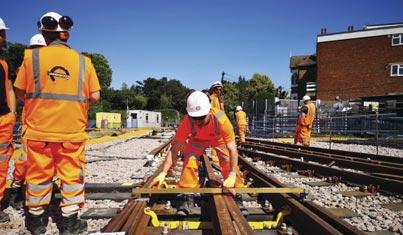
the RMT from day one to give them security within their employment through representation and understanding their rights at work along with a social aspect to being a part of a union including organising social events.
The outsourcing of centralised education for major apprenticeships such as Network Rail and London Underground has led to major issues and concerns such as the welfare of apprentices, quality of training and education, specifically with giving apprentices the skills they need to be prepared to be in their depots/workplaces.
However, in an encouraging development, Network Rail has decided to bring the education of apprentices back in house and to develop local network rail training centres starting this year.
YMAC apprentice
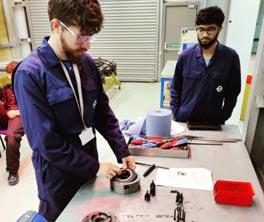
organising committee organiser Rhys Harmer said that the campaign will aim to organise all apprentices across the transport industry and the young members committee is looking for people to help out where possible.
“We have created material
for organising and apprentice inductions and the more people we can get involved the better,” he said.
If you are an apprentice or a young member interested in the work of the young members committee, please email YMChair@rmt.org.uk
RMT members working under the Offshore Diving Industry Agreement (ODIA) have won a pay increase of nearly 25 per cent after voting overwhelmingly in favour of strike action.
The three-year deal, backed by nearly 90 per cent of over 800 members in a referendum, represents a 15 per cent uplift from May and a 4.5 per cent increase in 2025 and another 4.5 per cent in 2026.
In addition, employers have agreed to incrementally reinstate six public holidays withdrawn during the Covid pandemic.
The Bend watch rate will also increase from 12 hours to 24 hours and travel allowance will increase by 36 per cent and allowances will be uplifted in line with RPI.
The union had put on two months of planned strike action by over 800 divers before negotiations commenced under the auspices of ACAS.
RMT general secretary Mick Lynch congratulated members for their steadfast determination to win a better deal following years without a pay rise to protect jobs during the downturn in oil and gas industry.
“This result really does show what the solidarity of workers sticking together to get what they deserved can achieve. The fact that they were prepared to take two months of solid strike action says it all.
“These divers and the
support crews work in a highrisk environment and they should be recognised for the crucial work they carry out.
“We should also recognise that without being organised at the workplace and engaged in dialogue with the employers
we could not have achieved this magnificent result,” he said.
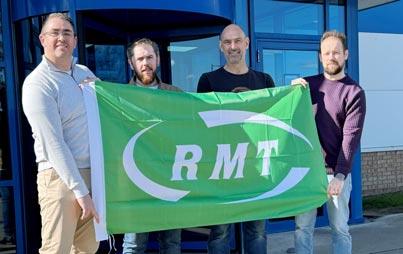

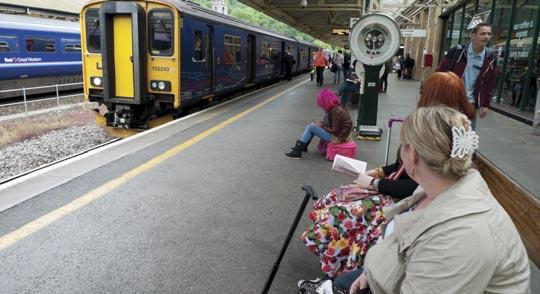
RMT has slammed the huge rise of violent crimes against women by more than 50 per cent across the rail network as totally unacceptable.
Commenting on the latest British Transport Police statistics in the past two years, RMT general secretary Mick Lynch said that the union had longstanding concerns about the prevalence of sexual violence on the public transport network.
“RMT’s own research has also found that 40 per cent of
women public transport workers have been sexually harassed.
“Evidence shows that properly staffed trains and stations support women and girls’ feelings around their safety and security when travelling and the presence of staff can also deter perpetrators.
“These shocking figures are a reminder of the need for guards on trains, and staffed stations and ticket offices to help address the epidemic of violence against women and girls,” he said.
The BTP commissioned survey by found that more than a third of women had been subjected to sexual harassment or sexual offences while commuting by train or Tube.
The number of crimes against women rose from 7,561 in 2021 to 11,357 in 2023. Sexual offences jumped 10 per cent from 2,235 to 2,475 over the same period, while sexual harassment reports doubled to 1,908.
The union also surveyed 1,400 women workers across rail, bus, metro and
passenger ferry and found that four in 10 women public transport worker said they had been sexually harassed at work in the last year though nearly 70 per cent of those affected did not report the incidents.
When asked why they did not report them, the most common response was that they did not think their complaint would be taken seriously. More than 80 per cent of women said that sexual harassment on public transport was becoming more of a problem.

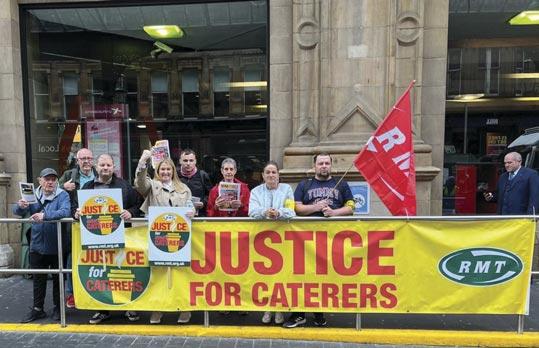
Caterers on Avanti West Coast took strike action recently due to imposed rosters causing widespread stress and fatigue among staff.
AWC caterers face short notice changes to shifts, job cuts, and enforced overtime, impacting their ability to plan
family commitments and attend medical appointments.
RMT general secretary Mick Lynch said that Avanti West Coast’s chaotic management had left staff unable to plan their lives, creating unacceptable stress and fatigue.

"Our members, who deliver crucial on-board catering services, have endured continuous job reductions, unpredictable work hours, and mandatory overtime.
"Avanti's disorganised management has made it impossible for staff to plan
their lives, resulting in an intolerable amount of stress and exhaustion.
"That's why they are taking action to demand that bosses give them a fair work-life balance and treat them with decency,” he said.






The new Passenger Railway Services (Public Ownership) Bill will contribute to rebuilding rail industry in Britain
Over 30 years ago the Tories introduced the 1993 Railway Act to break up and privatise this country’s rail network with disastrous, costly and often deadly results.
The private train operators have often claimed that they have delivered a doubling of passenger numbers due to privatisation. But as RMT has exposed in its reports, this is nonsense.
The reality is that passenger numbers are correlated closely
to GDP growth, that numbers were already rising under British Rail and that the privatised railway got lucky by coinciding with a long period of economic growth. The private operators know this and admit as much outside lobbying documents.
The business model of the private train operators has been intensely parasitic as they risk almost no capital. Just one per cent of money invested in the railway since
2006 was advanced by the train operating companies and over 90 per cent of all spending has been from the taxpayer.
The only way that passenger services could ever be made to turn a profit was by removing most of the costs of the railway from their cost base. Train operators made a small contribution toward infrastructure costs in the form of Track Access Charges paid to Network Rail.
However, these were held at an artificially low level by government subsidies to Network Rail. Had the train operating companies had to pay the real costs of their reliance on infrastructure they would all have gone out of business overnight.
The private operators often stress their small profit margins, but as a percentage of the capital they risk they are making good returns. These profits represent more than
120 per cent of the capital invested by the train operating companies.
On average over 65 per cent of all profits before tax made by the TOCs disappears out of the industry into the pockets of the owning groups and siphoned off by City investors or foreign stateowned companies to subsidise their own passenger fares.
In summary, these companies put almost nothing into the railways in terms of investment, typically making returns far above their investment and then funnel most of that money out of the railway industry. Any advances and improvements made in rail since privatisation have been paid for by the taxpayer while the private sector has skimmed them for wholly unjustifiable profits.
In return for this, the travelling public has endured a fragmented, incoherent, unreliable and increasingly costly rail system.
The incoming Labour government is finally committed to bringing passenger services back into public ownership as contracts expire or if contract terms are broken by the private operators.
Under Section 25 of the 1993 Act, public sector operators were prohibited from running franchises and failing services could only be
run in the public sector on a temporary basis under the Department of Transport’s Operator of Last Resort (OLR).
This deeply ideological neoliberal approach, in line with EU railways directive 91/440 introduced by Brussels in 1991, presumed that the government must re-tender each franchise for a private sector operator at some point. Indeed, the last Tory government stated its intention to return successful public sector operators like LNER to the private sector.
The new government’s Passenger Railway Services (Public Ownership) Bill removes this presumption and allows the government to place passenger services into the public sector operator as the first option when a franchise expires or is ended early for under-performance.
As franchising has progressively failed like a car crash in slow motion, the number of franchises being run directly by the OLR has exponentially expanded. Currently the OLR runs four English franchises with its equivalents in Scotland and Wales running three more.
This new bill reflects the need for the Operator of Last Resort to assume control of services in an orderly and phased manner that allows it to scale up its operations over time and ensure a good service while legislation to integrate it within Great British
August 2024
1st April 2025
25th May 2025
22 June 2025
20th July 2025
20th September 2026
18th October 2026
1st October 2027
12th December 2027
Railways (GBR) is progressed.
GBR will be an arm’s length body and ‘directing mind’ tasked by the Secretary of State with improving the rail network with a focus on passengers and freight customers.
Within the clear strategic direction set by the Secretary of State for Transport, Great British Railways (GBR) will be responsible for planning timetables, improving services, and the operation, maintenance, and improvement of rail infrastructure. This will be effectively re-uniting train and track under one body after being separated for so long.
This will bring finances together into a single body, enabling it to take long-term decisions to deliver improvements for passengers and freight and bring significant decisions around services and infrastructure under democratic control.
This provides the legal basis on which public sector passenger services can be rebuilt and constitutes an essential basis for the government’s wider reform agenda to deliver an integrated, publicly owned railway.
It will also deliver some early savings by cutting off dividend payments to private sector operators. On average, over the last seven years, the remaining private train operating companies have
paid out £130 million a year in dividends to their shareholders. Any profits can be put back into the railways, as was the case when LNER paid a £40 million dividend to the DfT in 2022.
This includes some of the worst performing operators like Avanti West Coast, which paid out £11.4 million last year and has paid out £36 million in the last three years.
Integration into the Public Sector Operator of Last Resort, prior to deeper integration into GBR, will improve performance too. In September 2023, even the Tories were forced to admit that those franchises within the public sector were operating well.
When the government integrates the OLR into the publicly owned body GBR with all staff employed by a single employer, it will deliver significant savings by finally eradicating the wasteful interface costs inherit in a fragmented rail network.
For example, the complex and much pilloried Delay Attribution system, through which over 400 people are employed to attribute blame for delays between Network Rail and the train operating companies, in order to compensate parties against commercial risks, will have no further purpose. Now that would be a better way to run a railway.
Franchises already in public ownership: LNER, Northern, SET, TPE, TfW, Scotrail, Caledonian Sleeper
Chiltern Railways and Govia Thameslink Railways core terms expire
South Western Railways' full term expires
Great Western's core term expires
c2c's full term expires
Greater Anglia and West Midlands' full terms expire
Avanti West Coast and East Midlands' core terms expire
Cross Country's core term expires
Chiltern Railways full term expires
RMT is holding a ballot to keep the union’s Political Fund because the law states that to run political campaigns to defend members rights, we must have a Political Fund and we must ballot our members every ten years to ask you to agree to keep it.
The ballot is not about political affiliation or whether you personally pay into the Political Fund. Members are voting on the basic right to keep the Political Fund so that RMT can continue to campaign to defend and advance their interests at work.
Your Political Fund is used to support a number of campaigns that affect RMT members at the workplace, these include:
• Better pay with reduced hours
• Defending jobs and conditions
• Protecting pensions
• More rights at work
• Improved health and safety
YOUR UNION. YOUR VOICE. USE IT, DON'T LOSE IT!
The employers are not required to have a Political Fund and can spend millions lobbying against your interests. Big Business is constantly lobbying for members to have less employment rights and worse
terms and conditions. Without the Political Fund we will not be able to effectively fight back. We will lose our political voice. We will not be able to run political campaigns on the issues that affect members at the workplace. That is why it is vital members VOTE YES to keep the political fund.
YOUR VOTE MATTERS
In the last RMT Political Fund ballot in 2014 RMT members voted by a resounding 96 per cent YES vote in favour to keep the Political Fund. Please vote YES vote and send a clear message that your union will keep campaigning to defend and improve your interests.
SUPPORT THE CAMPAIGN

VOTE YES TO CONTINUE OUR STRONG CAMPAIGNING VOICE
Rember the four key arguments for the Political Fund:



You can support the campaign and spread the word for a YES vote by obtaining campaign materials by emailing info@rmt.org.uk or visiting the website.
1. The Political Fund is not about affiliation to political parties or if members pay into the Fund. It is about the right of the union to keep the Political Funds so we can keep campaigning on the bread and butter issues that matter to our members in the workplace.
2. The Political Fund has already allowed the unions to win campaigns to protect jobs, pay, conditions and pensions and to win concessions on such issues as employment rights, hours at work, pensions and health and safety.

3. In the future the Political Fund will be used to defend and advance these rights and to support other campaigns, such as job security and better terms and conditions, public ownership and investment for public transport, travel facilities, opposition to outsourcing, repeal of anti-union laws and winning improved employment rights.
4. If the union doesn’t have a Political Fund, we won’t be able to effectively campaign on any of these issues. We will lose our Political Voice. The employers are not required to have a political fund and spend millions lobbying against your interests. Without the political fund we will not be able to speak on your behalf. We’ll be fighting with one hand behind our back.
The union has had a busy period recently meeting Ministers from the incoming Labour government, including the Secretary of State for Transport and the rail minister, the shipping minister, the bus minister and the Secretary of State for Energy and Net Zero.
The government had also announced important measures in the Kings Speech which will directly impact on RMT members, including the New Deal for Workers, the scrapping of Strike Minimum Service levels legislation, extending public ownership of the railways and greater public control of buses.
“Years of RMT campaigning on these issues, including by
our rank-and-file members, has helped achieve progress but we have massive challenges ahead.
“These include making sure we have sufficient investment in our transport and energy sectors, public ownership of all public transport, defending and improving jobs and conditions , repealing all antiunion legislation, ending outsourcing and introducing strong employment rights for all workers, especially after the P&O Ferries scandal.
“If we are to keep campaigning effectively in these areas members need to Vote YES in the forthcoming RMT Political Fund ballot.
“Remember the ballot is

not about political parties, RMT is not affiliated to any political party, or if you pay into the Political Fund. You are voting on the basic right for






the union to keep the Political Fund so we can keep campaigning on your behalf. VOTE YES!”
Show your support for the union.
Go to the RMT webshop on the RMT web site for more details.
Promote your branch, region and the union - call Pellacraft on 01623 636 602 if you have any queries.

Union
for strike action at RFA closes on October 10, don’t forget to vote
RMT members working onboard Royal Fleet Auxiliary (RFA) vessels around the world took part in further days of strike action against low pay. Members taking action from RFA Argus and Lyme bay in Darwin, Northern Territory, Australia were supported by Maritime Union of Australia (MUA) Darwin branch members.
Members docked in Singapore also took part in the action joining members around the UK in other areas of the world bringing a global spotlight on poor pay, and terms and conditions of employment at RFA when compared to other shipping companies.
RFA ratings downed tools the day after RFA officers took
strike action for the first time in the long running dispute over low pay in what even the government believes is an essential and professional service.
RMT general secretary Mick Lynch congratulated members for taking a fourth day of strike action but lamented the fact that ministers and the Ministry of Defence (MoD) were in no
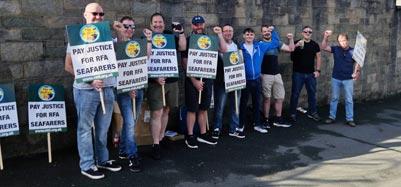




hurry to resolve the ongoing dispute.
“This union has been repeatedly told that the MoD will look to start pay negotiations with vague promises of further meetings but is clear that the MoD are failing to address our concerns.
“RMT members remain out of pocket from the current derisory pay settlement and the RFA seem content to kick this issue into the long grass.
“If the RFA believes that its workers are as ‘highly trained and working to the same standards as other military personnel’ as it says then it should be reflected in what they are paid.
“The re-ballot of RFA members is well under way and it is vital that we achieve the highest possible turnout so that we can meet the thresholds demanded by the current strict anti-union legislation.
“RMT remains ready to enter into meaningful talks as ever,” he said.


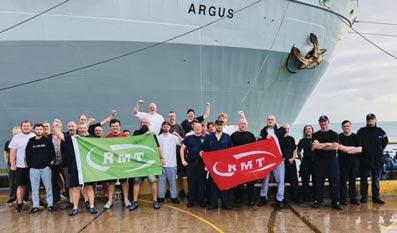

RMTnational secretary Darren Procter met with Port of Dover Cargo Ltd (PODCL) reps Shane Heppel (left) and newly elected Arthur Black (right) who were joined by Dover branch secretary Carl Holman to discuss workplace concerns and organising within the ports sector.

RMT has won trade union recognition for maritime members working for Svitzer (formerly Solent Towage) in Fawley refinery near Southampton.
RMT national secretary Darren Procter said that the union had gradually increased membership and now established formal recognition
for workers engaged in Tugboat operations assisting tankers into Fawley refinery.
“We will now be seeking to elect two industrial representatives and two health and safety representatives as we drive towards 100 per cent membership and an organised workforce,” he said.
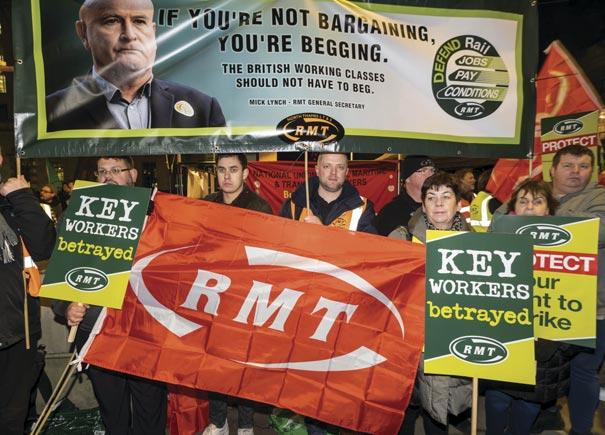
Union welcomes removal of Tory thresholds for strike action and minimum service levels legislation
RMT has welcomed plans by the Labour government to remove years of Tory antiunion laws which only served to heighten the likelihood of strike action and further damage industrial relations.
The anti-union laws set to be scrapped included requirements for higher thresholds for strike action. The Trade Union Act 2016, introduced by the Tories when David Cameron was prime minister, created legal minimums for strike ballots to be valid.
As a result, at least half of trade union members must take part in any strike vote and the legislation requires 40 per cent of workers in public services such the NHS, education and transport to vote in favour for a walkout to be lawful.
It is expected that Labour will put the changes in legislation before Parliament by mid-October.
The plans follow on from the manifesto pledge to repeal the Strikes (Minimum Service Levels) Act 2023 which would have forced about 40 per cent of rail services to run on strike days.
The formal repeal of this draconian law will be part of the upcoming Employment Rights Bill.
In the meantime, Ministers are asking departments and employers not to use the legislation and to seek resolutions with trade unions on many outstanding current disputes mismanaged by the previous Conservative government.
RMT general secretary Mick Lynch said that the moves were an opportunity to reset industrial relations in Britain and to move to a position of negotiating just settlements to disputes rather than having trade unions attacked and demonised.
"This success of ensuring the repeal of Minimum Service legislation is a direct result of the concerted efforts by the trade union movement, and
we will continue to champion the interests of railway staff, seafarers and offshore workers.
"We will also remain actively engaged with the government to address and swiftly resolve pay issues within our sectors,” he said when the changes were announced.
RMT has campaigned hard to strengthen, defend and extend Labour’s New Deal for workers. The government’s first King’s Speech confirmed that the new government would bring in an Employment Rights Bill within the first 100 days.
The precise contents of this Bill are also likely to cover New ‘day one’ rights to sick pay, to protection from unfair dismissal and to parental leave are likely to be in the legislation, alongside a default right to flexible working and strengthened protections for new mothers.
The government has pledged to repeal the absurd Minimum Service Levels legislation, rushed through Parliament by the last government in its attempt to crush rail workers’ strikes. It has also pledged to repeal the 2016 Trade Union Act, which introduced voting thresholds for strike ballots that are unparalleled elsewhere in Britain’s democracy.
There is also a key commitment to ban exploitative zero hours contracts, giving workers a right to a contract that reflects their regular hours of work. The significance of this commitment should not be understated. RMT estimates that there are tens of thousands of workers in the transport industry on some form of zero hours contract. This includes Network Rail’s vast infrastructure supply chain. The New Deal also contains commitments to transform public sector procurement to create good jobs and ensure that contracts
go to those who create social value.
The Employment Rights Bill is also likely to contain reforms to the law to tackle the use of fire and rehire or as in the case of P&O, ‘fire and replace’. The union will also be pressing for a mandatory employment charter to protect seafarers’ jobs and conditions in the ferry sector.
There will also be some reforms aimed at increasing the ability of unions to organise and act within the workplace. The King’s Speech promised a simplified route for unions to seek statutory recognition and enhanced rights for unions to access workplaces. This will be coupled with measures to ‘remove unnecessary restrictions on trade union activity.
Taken together, the measures likely to be seen in the Employment Rights Bill are a big step forward for unions. Significant sections of big business in Britain understand this only too well, which is why they have lobbied consistently to water down the New Deal. The labour movement as a whole will need to mobilise politically to see this legislation across the line.
There is clearly a bigger prize to be won. RMT has never seen the New Deal, as it stands, as the finished article. Instead, it must be a steppingstone to the next big advance,
which must be to extend collective bargaining across the economy and ensure that the promised ‘wave of insourcing’ becomes a reality. Why is this so important? In Britain today only one in four workers are covered by a collective agreement and it is no coincidence that the British economy is characterised by low pay, low productivity and in-work poverty. Giving workers rights without the power to enforce them is of limited use. Collective bargaining gives workers that power.
Outsourcing was designed to remove workers from collective bargaining and create multi-tiered and fragmented workforces. Wherever it has happened it has compounded the effects of low pay and buttressed inequality.
Therefore, the trade union movement needs to get this phase of the New Deal implemented and campaign for improvements in the next phase.
Your union knows that the big business lobby and its friends in the millionaire press will be reaching into their deep pockets of wealth to oppose the New Deal. That is why winning the Political Fund vote is an absolute must. Without RMT’s Political Fund it can’t hope to even contest that political space against the organised power of big money.


RMT bus members working for First South West took further solid strike action against low pay at depots across Cornwall and Somerset.
Many activists on picket lines spontaneously crossed arms in response to employers attempts to ban the folding of arms in negotiations claiming
that it was an aggressive stance.
Speaking from a picket line at Penzance, RMT general secretary Mick Lynch congratulated members for taking the fourth day of action in the dispute which had prevented buses from operating across the region.
“This union has put forward three different proposals following local consultations to prevent further strike action, but the bus company has refused to negotiate to end to the dispute.
"First South West’s parent company is raking in profits of £204 million while these are
some of the lowest paid bus workers in the country.
“It is time for the company to recognise the level of anger amongst its workers and sit down to work out a settlement based on the contribution these essential workers make to the region,” he said.





Theannual reports of the Rail Safety and Standards Board (RSSB), the Rail Accident Investigation Branch (RAIB) and Office of Rail and Road (ORR) all carry stark warning for the railway industry.
The RAIB even questions whether the rail industry has learnt lessons from the 1988 Clapham Junction and 2020 Carmont deadly railway accidents.
A recommendation from the Hidden Report into the Clapham disaster called for Train Protection Systems – and the legal requirement for this system was established 20 years ago.
However, the RAIB refers to several speeding events not protected by an engineered solution of train protection. Instead, there was complete reliance on the individual signaller or driver to react correctly.
“Train Protection Warning System (TPWS) fitment was a stopgap measure while the railway waited to fit automatic train protection, which would bring with it features to supervise the speed of trains” and found that despite decades having passed “universal fitment of such technology is a long time away”.
The RAIB refers to incidents at Waterloo, Dalwhinnie and South Wingfield which saw the integrity of the signalling system being compromised by the incorrect application of processes developed following

the Clapham disaster. It explained that those with personal knowledge of Clapham who know the importance of safety processes have retired or moved away from front line jobs and that “this has impacted on the corporate memory vital to achieving safety”.
The fatigue section of the RSSB report focuses on addressing the problem and supporting industry trials for ‘driver attention and alertness technology’. The ORR, responsible for the economic and safety regulation, was concerned about high numbers of staff working longer hours than allowed for in Network Rail (NWR) standards – and that the company could reduce this by
addressing staff retention issues and improving industrial relations.
Although there were no accidents, near-misses continue to happen. Main causes were trains mistakenly signalled into line blockages, and workers on open lines thought to be in a possession or line blockage.
There was also a high rate of earthworks failures particularly to linked to high rain fall.
In 2020-2021 NWR committed to completing drainage asset surveys by the end of March 2024. Three regions met this deadline, but two – Southern and Eastern –did not.
It said that NWR had implemented four of the 18 Mair recommendations but “struggles to deliver enough
earthworks and structures examinations”.
There had also been an increase in the category A SPADs and the ORR has called for a committed industry-wide approach to future train protection and speed supervision.
Finally, on Modernising Maintenance (MM), the ORR warned that more “needs to be done in a way that does not overload people with too much change too quickly, nor result in fatigue. An increased focus on occupational health risk is also required”.
The ORR also found that there were high levels of backlogs and deferrals of scheduled work, staff working long hours, and fewer staff to call on. The ORR said that it would continue to monitor MM in the next year.
Your union recently took a decision to launch a serious organising campaign at Office Cleaning Services (OCS) Group contracts covering Avanti West Coast/Alstom, Great Western Railways and LNER.
These outsourced workers are members of twenty RMT branches across six regional councils. Outsourcing brings its own challenges to traditional organising approaches.
By making use of modern data analysis methods allows the union to overcome the fragmentation of the workforce and begin the process if uniting members against the employers’ attacks and to improve eroded terms of employment.
The union needs to build the membership on these contracts to strengthen the voice of these cleaners who have been forced to accept pay increases far below what they deserve.
RMT assistant general secretary Eddie Dempsey called for local leadership to build membership using evidence-backed branch interventions in the workplace.
“Our message is that we want to win and the way to do it is comprehensive organisation of the workplace. To do that we need to be more sophisticated and plan
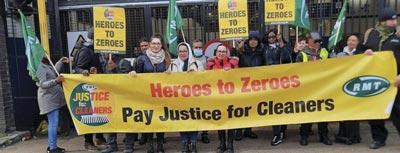
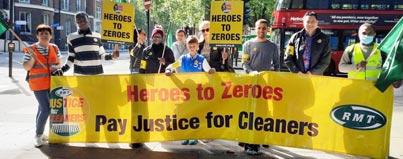
how we reach every worker.
“Some might choose not to join but we need to make sure everyone is approached and understands why they should be in RMT.
“Regional councils that cover the three OCS Group contracts have been provided with the data about membership and members will be working from this to ensure that when the pay anniversaries come around RMT has the necessary
membership density and workplace activists to bring our leverage to bear and win.
“There will inevitably be a conflict between shareholder profit and decent pay for those that do the work, but the union will be fighting for workers in poorly paid and traditionally precarious employment who, nevertheless, are vital to the operation of the rail network.
“Members and activists will know that there is a strong
culture of RMT in the transport industry and there is now an increasing array of tools that the union can use to organise those areas now outsourced which in the past would have been under a sole employer.
“Outsourcing is a scourge and the excellent RMT Cleaners’ Charter sets out an alternative vision and demands for our workers in cleaning grades,” he said.
An RMT member who suffered a broken ligament to the middle finger on her right hand while tackling a fare evader has received compensation following her ordeal. The injury occurred when a passenger forced open the ticket barrier the member was staffing, overstretching the middle finger, causing significant damage.
The RMT member instructed workplace injury experts at Thompsons Solicitors to bring a claim for compensation and it was possible to negotiate a satisfactory settlement without court proceedings. The insurers accepted responsibility for the incident, and our member received an out-of-court settlement of £10,924.75, reflecting the severity of her injury and its impact on her personal and professional life.
The successful recovery of
damages in this case underscores the importance of the union’s legal services. Additionally, it is hoped that this outcome will assist health and safety reps in the workplace and help prevent similar accidents in the future. This case demonstrates that the union is committed to taking on cases that claim companies and no win/no fee solicitors might not, ensuring members receive the support and justice they deserve.
An RMT member who suffered a noise-related injury at work has received a financial settlement in relation to the incident. The incident occurred when the member, operating a 1972 Tube Stock train, was unable to switch off the hightone whistle in the cab.
The member sounded the high-tone whistle as a warning to staff on the tracks. However,
the toggle that activated the whistle became stuck, and the whistle continued to sound. Unable to silence the whistle, the member radioed control. To explain the situation and receive instructions, the member had to remove his hearing protection, exposing him to harmful levels of noise. This excessive noise led to stress, constant earache, headache, and bilateral intrusive tinnitus.
Following his ordeal, the member instructed workplace injury experts at Thompsons Solicitors to bring a claim for compensation. Despite the defendant's denial of liability, expert evidence was obtained from an engineer specialising in occupational noise exposure and a medical expert in the field of hearing damage.
The defendant’s insurers initially refused to negotiate a settlement, necessitating the commencement of court proceedings but a settlement was reached without the need for a trial.
An RMT member who suffered injuries while employed as a signaller has received
compensation from his employer, Transport for Wales. The member was walking towards the signal box in an area that was dark due to lights being in disrepair—a hazard that had previously been reported.
He lost his footing and fell, landing on his left arm, which pulled on an anti-slip on the stairs, resulting in injury. An adequate risk assessment and timely repairs to the lighting could have prevented the incident and injuries.
Following the incident, the lights were repaired. The member instructed workplace injury experts at Thompsons Solicitors to bring a claim for compensation. The defendant admitted liability and a medical expert determined that the member sustained grazing to both forearms and elbows. The injuries took about four weeks to heal, leaving scarring. The accident also accelerated pre-existing arthritis in the left elbow by up to one year.
Settlement negotiations resulted in the member receiving a settlement award of £7,000, reflecting the severity of the injuries.
If you are experiencing difficulties in the workplace and need advice regarding a potential employment tribunal claim contact the union.
In the first instance, ensure that you contact your local RMT Representatives or Regional Organiser. Then complete an L2 – Request for Legal Assistance (available on-line) and send it to your Regional Office with all supporting documentation.
RMT’s legal department deals with virtually all cases from assessment to the case’s conclusion at a tribunal for members across England and Wales. The legal department has also submitted claims to Employment Appeal Tribunals.
The in-house legal department is now firmly established and employs four solicitors and continues to advise and support
•
•
•
•
•
members in their work-related criminal cases in the Magistrates Court.
This often involves defending members against false allegations made by the public of assault, false allegations of theft and alleged driving offences. Furthermore, it continues to offer tailored advice and support for bus and taxi drivers, in respect of their licensing issues, licensing appeals before the Magistrates Court, driving offences, and in respect of appearances before Traffic Commissioners.
The In-house legal department continues to strive to deliver a first-class service to all of members. They are committed to provide a strong service to assist the union through the ever-changing legal landscape and their successes have grown yearly.

Every year, millions of us head off on holiday not realising the risk we run by travelling without insurance. If the unexpected happens, travel insurance could save you shelling out for hefty bills.
With the holiday season in full swing, the Association of British Insurers (ABI) is reminding holiday goers to ensure they have their travel insurance details on hand when travelling overseas While holidays are typically memorable for all the right reasons, having access to travel insurance information is crucial in case of emergencies like requiring urgent medical care abroad.
A striking example is that the average claim for emergency overseas medical treatment is at its highest ever, with one claim costing a remarkable £250,000.
The Association of British Insurers (ABI) reported that in 2022, travel insurance providers paid 362,000 claims worth a total of £352m to travellers who needed help while they were abroad.
FLEXIBLE COVER ARRANGED FOR RMT MEMBERS
We all hope our holidays are hassle-free, but that isn’t always the case. When you’ve spent your hard-earned money on a holiday, it makes sense to make sure you can enjoy it without the added stress of worrying about how you’d cope if it all goes wrong.
RMT have teamed up with RMTProtect to bring you a brand new Travel insurance cover to help provide peace of mind and ensure your holiday remains hassle-free. The new RMT Travel insurance lets you flex your cover limits, up or down, such as excess, baggage and cancellation cover – to suit your needs.
Whether you’re off on a weekend getaway or need long-term protection for an extended trip, we’ve got you covered.
Ensure safe travels ahead with NEW RMT Travel Insurance
Planning a summer holiday? The right cover for you is just a few clicks away.
Enjoy added peace of mind on holiday with flexible travel insurance from RMTProtect. There are four levels of cover to choose from as well as a host of optional extras so you can tailor your needs.

Four levels of cover
Customise cover limits to suit your needs –for example, you could lower your excess or remove baggage cover if not needed
£10m medical emergency cover (premier) Up to £10,000 cancellation cover (premier) Up to £3,000 baggage cover (premier)
Travel disruption included as standard
Many sports and activities included as standard
Planning on taking more than one trip? You could save time and money by taking out an annual multi-trip policy, which covers you for every trip you take over a 12-month period. That’s one less thing to worry about. For a quick quote, scan the QR code or visit:

*£20.51 Individual single trip standard cover (7 nights in Spain)
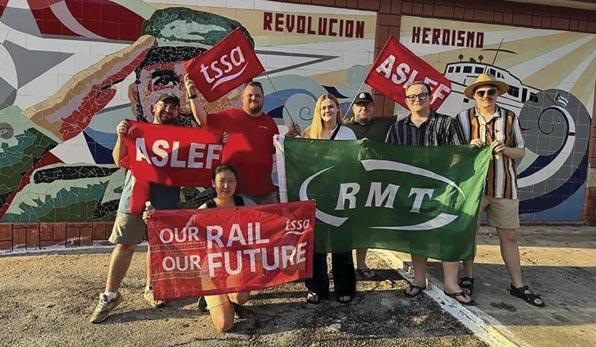
SOLIDARITY: A delegation of rail workers in Havana
Myself, Sarah Cundy and James Braithwaite formed the RMT delegation on the annual May Day brigade organised by the Cuba Solidarity Campaign in Britain with the Cuban Institute of Friendship with the Peoples (Instituto Cubano de Amistad con los Pueblos) ‘ICAP’.
The brigade was made up of 37 trade unionists –representing Unite, UNISON, RMT, ASLEF, TSSA, PSC, POA, NAPO, GFTU and Thompsons Solicitors. It was good to meet other internationalist trade unionists from Britain especially our sister unions
TSSA and ASLEF.
The Brigade had two aims: to provide practical solidarity to the Cuban People and to educate trade unionists from Britain about the Cuban revolution and way of life.
We stayed on the ICAP camp for international delegates in Artemisa.
Conditions on the camp were basic with cold showers, no flushing toilets, washing machines and little phone signal. But it was refreshing to live without so many of the pressures of consumerism for a while. The camp had 330 trade unionists and activists
from 33 countries on various solidarity brigades making it a great way to learn about struggles all over the world.
We also stayed in the city of Cienfuegos and visited Havana.
The first aim of the bridge was achieved by agricultural work organised by ICAP. This was helping to bring in crops and clear fields. The brigade worked a combined 5,208 hours, equalling about 128,000 pesos of work at a rate of 13.50 peso an hour. This is very important work in a country with allocated rations of many food stuffs. We also
delivered supplies such as medicines and school equipment that are difficult to obtain in Cuba due to the United States embargo which has existed since 1962, the longest running blockade in history.
Learning about the US blockade, which includes a near total embargo on goods and services to Cuba, was a key part of the education brigade members received. The blockade even included basic medical supplies during the Covid pandemic. It is even illegal in US law for its citizens to go on holiday to Cuba.
Washington also bullies countries including our own into supporting this illegal blockade.
The misery and shortages caused by this blockade effecting millions of Cubans has been classified as a genocide. The reason for this US blatant hostility, as we learned from a range of speakers and visits, is because since 1959 Cuba has been run by workers and trade unionists who put the interests of Cuba’s people ahead of profits for big US business interests.
We saw this on visits to
hospitals where all health care is nationalised and free at the point of need and meeting many people who had received world renowned Cuban education completely free from nursery through to university.
Unlike the US exporting sanctions and terror, Cuba (despite being a poor country) has made its achievements open to all. We found out about Cuba’s medical brigades which go to other, often richer, countries and give medical aid often for free. Similarly, Cuba trains doctors from developing
countries all over the world where training would be difficult such as Palestine. We finished the trip by taking part in the May Day rally in which saw hundreds of thousands take to the streets of Havana outside the US Embassy demanding an end to the blockade alongside millions of others across the country.
Delegates also took part in a conference of solidarity in Havana with the final address by Cuban President Miguel Díaz-Canel calling for the end to war and for peace across the world.
Between 30 July and 5 August this year, far-right political activists set off anti-migrant, racist, hate-fuelled mob violence in towns and cities across England and Northern Ireland.
Rioters targeted mosques, asylum seeker hotels, homes, cars and above all people who are identifiably Muslim, black, or foreign for assault, damage to property and arson. This was terrorism, plain and simple.
Public transport workers were also targets for racist violence. As far-right activists zoned in on the latest social media disinformation, they left a trail of racist attacks on RMT members and other transport workers in their wake.
They also left racist stickers on public transport concealing razor blades, intended to cause physical injury to Train Cleaners, or anyone else trying to remove this filth.
Over 1,000 people have been arrested so far over the racist violence, with around 480 charged and at least 99 sentenced to prison terms, in many cases not for the first time.
The sordid details of the convicted rioters can’t distract from the fact that the groundwork for these racist riots was laid by years of Islamophobic propaganda and anti-migrant hysteria in the pages of The Daily Mail, echoed by government ministers and leading Tory and Labour politicians.
In this intimidating atmosphere, the role played by our trade union and others has been key, bringing courage and confidence to anti-racists and those standing up to defend their communities and their neighbours from racist mobs.
On 5 August RMT asked branches “where possible to contact their local mosques, refugee centres and solidarity groups to offer our union’s solidarity and support on the ground at a time when they face severe threats and intimidation.”
I want to thank the many RMT members, reps and activists who stepped up and stood shoulder to shoulder with local communities under threat of attack. I saw RMT flags on anti-racist protests from Merseyside to London. Your
Cuba is a very poor country with many problems. Unlike its neighbours and much richer countries in North America or Europe, Cuba is a country that puts the needs and well-being of its people first creating a sense of hope and solidarity throughout the country. There is nowhere else quite like it and I am incredibly honoured my union gave me the chance to see it not as a tourist but as a friend and comrade from another island nation which could learn much from Cuba, its revolution and its people.
bravery and solidarity count for more than you may think.
After recent years, when the sight of RMT flags and banners on picket lines has been plastered across newspapers and TV media, making us the most prominent union in Britain, knowing RMT is standing up against racist mob violence is an enormous support to the brave people who came out in Liverpool, Newcastle, Sunderland, Walthamstow and elsewhere and stopped the far right.
This latest far-right violence comes on the heels of a National Police Chiefs’ Council (NPCC) report in July 2024 acknowledging that violence against women in England and Wales is a “national emergency’”. The NPCC analysis shows 2 million women a year are victims of male violence, although NPCC admits this is an underestimate because many if not most offences were not reported.
The figures are evidence of shocking levels of attacks on women in this society. RMT has denounced the huge (over 50 per cent) rise in violent crimes against women on

Britain’s trains. RMT’s research finds that 40 per cent of women public transport workers have been sexually harassed at work.
Violence Against Women and Girls (VAWG) highlights in an extreme form how women’s oppression is enabled by sexism often fuelled by extreme internet material and misogynist online ‘influencers’.
Some of these online ‘influencers’ were the same ones spreading disinformation about Muslims and migrants in the aftermath of the tragic murders of three young girls in Southport on 29 July, whose deaths sparked the far-right riots.
Violence at work and in our communities is a working-class issue. Workers rarely live in gated communities with private security. Trade unionists have a key role combatting racist and sexist violence.
Alex Gordon


RMThas called for soaring Crown Estate profits to be used to secure decent contracts, pay and working conditions for offshore workers.
The Crown Estate, which owns the country’s seabed up to 12 miles offshore, has announced a record-breaking net revenue profit of £1.1 billion for the 2023/24 financial year, a 41 per cent increase attributed in part to long-term investments in wind power.
RMT said that it was an
opportunity to use these profits and expanded borrowing powers to improve employment conditions and promote sustainable supply chains in the offshore energy sector.
Improving employment conditions would support a 'just transition' for oil and gas workers to the clean offshore energy sector, which is crucial for meeting international carbon reduction targets.
However, recent failures by the previous government have led to no bids from offshore
wind developers in the Contract for Difference (CfD) Allocation Round 5, creating uncertainty for thousands of offshore workers.
The new Scottish Secretary has also committed to reforms supporting worker retraining in the renewables sector. Similar reforms in England and Wales could positively impact Crown Estate Scotland, where worker protections are currently weaker.
RMT general secretary Mick Lynch said that offshore
workers and seafarers faced an uncertain future existing on insecure contracts.
"We welcome the Labour government’s plans for a Crown Estate Bill and look forward to a better deal for offshore and supply chain workers.
"Lucrative leasing agreements have returned £1.1billion to the Crown over 12 months but none of this has been ringfenced to advance just transition policies," he said.
union RMT has slammed oil and gas companies for complaining to the government about plans for a windfall tax despite raking in record dividends and profits.
Over 40 companies have warned that any such plans threatened investment in all forms of domestic energy, including renewables despite having already slashed over
200,000 jobs and actively blocked publicly funded measures like an offshore training passport.
RMT general secretary Mick Lynch described corporate complaints against a small rise in a windfall tax first implemented by the Tories as rank hypocrisy.
“We are only talking about a three per cent increase of windfall taxes on oil and gas
profits from to 78 per cent to bring the UK in line with Norway.
“When the public are facing a 10 per cent increase in their energy bills, a three per cent increase in tax on oil and gas profits will be seen as entirely reasonable.
“These companies should concentrate on investment in people and skills and developing
positive engagement with trade unions, and supporting the extension of sectoral collective bargaining rights for all workers across the supply chain.
“This is the key to a successful energy transition as the oil and gas volumes are gradually reduced for alternative greener fuels in the years ahead,” he said.

The film London Recruits, which is due out later this year and features a very handsome actor playing me!, concentrates on the people who took part in the leaflet bombing, which rocked many cities in South Africa in 1971. It gave hope to millions, but some comrades paid a very heavy price. Captured, tortured and long prison sentences were handed out to some.
By the early 1970’s the Apartheid regime had succeeded in suppressing any opposition to its racist laws. The African National Congress (ANC) leadership was either in prison with life sentences or in exile, forced to flee their homeland. The regime boasted that they would be in power for a thousand years. So called separate development was here to stay. Get used to it.
Virtually all opposition was illegal. The catch all “suppression of communism” act effectively banned all opposition to the whites-only regime. Even the mildest of dissent would not be tolerated. Democratic change through the ballot box was impossible, as democracy, as we understand it, was for a tiny minority of the South African population, and all peaceful protest was met with
the utmost violence.
Almost all ANC members who were not in prison had to go into exile, to avoid arrest and torture. The leadership in exile, led by Oliver Tambo, faced a problem: how were they going to carry on their liberation struggle from outside?
Oliver Tambo asked a young comrade Ronnie Kasrils if he could organise some people to go into South Africa posing as tourists, would-be immigrants, business people or honeymoon couples.
They were to carry out agitational work and some basic rules were drawn up. They would have to be white, as they would not attract suspicion and only white people had freedom of movement. They had to be committed to the overthrow of the racist regime and they must be willing to undergo basic training and understand the risks they were taking.
Most people selected were working class activists and trade unionists. They had been on demonstrations against the Apartheid regime and against the US war in Vietnam. Most were members of the Young Communist League. Some were London School of Economics students and some of these were in the International Socialists.
Once selected, recruits were asked to undertake various missions to South Africa or nearby countries. They were told that if caught they would face a MINIMUM of five years imprisonment with no remission; five years would mean five years.
Some of the tasks that the recruits were asked to undertake included learning how to construct and explode leaflet bombs. These were not designed to harm anyone (which they never did) but to get information to the African working class on their way home from work. Remember, you couldn’t just hand leaflets out on street corners. To advocate equal rights for all South African citizens was illegal. Explosives were smuggled out in false bottomed suitcases. In the false bottom was gunpowder, timing devices, and leaflets advocating freedom for all.
Some recruits set up street broadcasts using amplified cassette players that delivered messages of solidarity and calls to action. Some were tasked with the delivery of monies and forged passports and passes, others smuggled agitational material hidden on board tourist ships. Recruits posing as a honeymoon couple smuggled men and arms from Zambia to
Botswana, close to the South African border, and in 1986, a tourist safari company was set up using a truck modified with secret compartments to smuggle arms to the liberation forces.
No-one got paid for these activities, these were acts of international solidarity and some were to pay a heavy price for their actions. Two, Alex Moumbaris and Sean Hosey were arrested, tortured and imprisoned for many years.
The film London Recruits will be released in November and we are calling on trade union branches to support the launch by arranging a showing at their local independent cinema. To sign up, visit bit.ly/LRPeoplesRelease.
We also need to raise £65k from the trade union movement to secure the release of the film. You and your branch can donate at https://bit.ly/LondonRecruitsFilmF und


Once a thriving industrial line serving the Kent coalfield, the East Kent Railway (EKR) begins at the village of Shepherdswell and takes you on a four-mile round trip taking in the village of Eythorne.
Rolling countryside, steep chalk-lined cuttings and the fascinating 550-yard Golgotha tunnel make this a visit worth making.
The East Kent Railway was completed in 1917 to serve the growing Kent coalfields being developed in the area. It was envisaged that the line would link the collieries with the mainline but planned branch lines to Canterbury, Deal, and Birchington were never completed.
The line from Shepherdswell to Tilmanstone Colliery remained operational until the 1984/85 Miners Strike. Tilmanstone Colliery reopened
for a short while but eventually ceased production in 1986 and closure of the line followed in 1987.
The East Kent Railway Society was formed as a charity in 1985 to save the line, but it was not until 1989 that volunteers began the huge task of clearing the thick vegetation that had claimed the railway since closure.
In 1993, the Light Railway Order was obtained, allowing regular passenger trains to run after an absence of over forty years. Since then, a new station has been built at Eythorne.
EKR general manager Matthew Plews explains that this small heritage line near Dover and Deal is really a forgotten gem which still has a lot to offer visitors and is still expanding since reopening services in 1995.
“There has been an
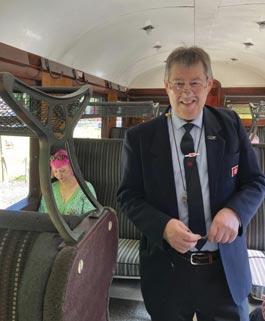


explosion of activity over the last decade and we are building up to our 30-year jubilee next year.
“This includes expanding our facilities here as well as the collection of trains and carriages and the usual events including the popular beer festivals,” he said.
The society has transformed the station area and its environs at Shepherdswell, with a replica of the original station building and platform being built, along with new access roads, car parks and the addition of toilet blocks, a café and picnic areas. There is also work going on building a fully functioning restaurant carriage at Eythorne.
The railway is also home to two signal boxes, one from Barham on the old Elham Valley Line and another from Selling, near Faversham. Both
Kent and East Sussex railway celebrates 50 years in existence turning a carriage into a work of art
Internationally renowned artist Mr Doodle (Sam Cox) creates the world's first Doodle Train, covering a 64-foot train carriage with his signature
doodles - to mark the 50th anniversary of the Kent and East Sussex railway, at its base at Tenterden station in his hometown.
boxes house interesting displays on the history of the EKR. The Walmer Model Railway Club is also situated in the car park with an exciting model currently under construction by enthusiastic and friendly volunteers in a beautiful LMS coach.
The railway is also home to the 400 Series Preservation Group, Southern Electric Group and the Trolley Bus Group. The railway runs trains on most Sundays throughout the year, with a limited service in the winter months.
Please visit the timetable and events pages for details of all train times and events throughout the year. The railway itself is open for woodland walks along with the cafes Tuesday to Sundays.
For more info go to: eastkentrailway.co.uk

On April 24 last year, the body of 35-year-old Alex Dolorosa was found behind a chicken coop on the outskirts of Bacolod City in the Philippines. He had been beaten and stabbed 23 times. Alex worked for BIEN, a union organising workers in local call centres.
Before his killing, he had been “red-tagged” - labeled by government agencies as a “terrorist”. 72 trade unionists have been murdered in the Philippines since 2016, most of them in unions belonging to the leftist Kilusang Mayo Uno (KMU) union centre.
When Ferdinand Marcos Jr, the son of the old dictator, assumed power in 2022, one of his priorities was to repair the family’s international image and he promised to end human rights abuses. Yet it was not long before the grip of repression was being tightened. In particular, Marcos retained two key instruments introduced by his infamous predecessor Rodrigo Duterte. These are the Anti-Terrorism Law and the National Task Force to End Communist Local Armed Conflict (NTF-ECLAC).
The Anti-Terrorism Law gives the military sweeping powers to arbitrarily designate organisations and individuals as terrorists, detain suspects without a warrant, and freeze bank accounts. The NTFECLAC is a dirty war counterinsurgency agency that, among other things,
orchestrates the “red-tagging” of those who criticise the government.
According to KMU President Elmar Labog, trade union activists are commonly victims of red tagging.
“This can be by anonymous social media posts or announcements on local radio. Soldiers may leaflet your neighbourhood; large banners carrying your picture will be hung across the streets or on government buildings. It isolates you in the community and puts your life at risk from death squads.”
When the capital Manila was brought to a halt by striking transport workers last year, the country’s Vice President Sarah Duterte publicly accused the KMU’s transport union PISTON of being linked to terrorism.
False criminal charges, frequently for illegal possession of arms, are also used to take union activists out of circulation. It is common practice for the police to plant weapons on suspects. No matter how trumped up the charges may be, they can put union activists in prison for years awaiting trial. Lindy Perocho, a staff member of the KMU’s National Federation of Sugar Workers (NFSW), was arrested by soldiers in 2018 on charges of possessing weapons. Her case was thrown out of court this March, but only after she had spent six years in prison. The Manila-
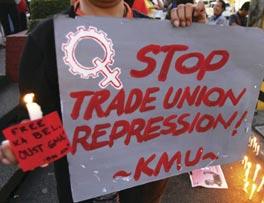
based Centre for Trade Union and Human Rights currently lists 28 trade unionists who have been held in prison for between three and six years without coming to trial.
Western governments seem ready to turn a blind eye to the country’s human rights abuses. The Philippines is seen as a strategic partner in the US-led alliance facing off China in the South China Sea.
This year the UK Government signed a military cooperation agreement with the Philippines and will be conducting joint exercises with the same Philippines military that is accused of war crimes against indigenous peoples and which shoots and arrests trade unionists.
KMU President Elmar Labog says: “Repression of trade unions and other civil society organisations is being ignored. The protection of freedom
against tyranny in our region should start with the protection of human and trade union rights. We demand our Government stop the killings, scrap the Anti-Terrorism Law, disband the NTF-ECLAC and release all trade union prisoners.”
@ The UK Campaign for Human Rights in the Philippines (CHRP) has set up a Trade Union Prisoner Defence Fund. Branches wishing to donate can transfer money to CMPGN HUMAN RIGHTS IN THE PHILIPPINES Sort code - 08 02 28 A/c no50065244 with the reference TU Defence Fund.
CHRP also runs a campaign against UK military cooperation with the Philippines. RMT branches may affiliate to CHRP at an annual £100 fee. Contact info@chrp.org.uk.
Repsand activists from RMT’s Medway and District branch were out and about on a recruiting and organising day. RMT regional organiser John Parsons was jalso oined by newly elected engineering Company Council rep Chris Eccles from Ramsgate Engineering Branch.
The main focus was the Train Care Depot at Gillingham where members spoke with most of the engineers on duty, joined up two new members and started a conversation with one longer serving member who was considering standing for the local rep vacancy at the shed.
Once Chris Eccles had updated the notice board at the depot, we moved across to speak with the Churchills Cleaners at the depot, led by John Johnstone CC Rep for Churchills SET contract where John Parsons surprised him with a presentation of his 10year badge.
“Churchills and other outsourced cleaners have been through the wringer over the last few years, but we are committed to keep fighting for
decent pay, sick pay and free travel to and from work as a bare minimum of a fair deal for our grades.
“We all need to concentrate on recruiting and organising the cleaners and all outsourced grades as a matter of urgency because it will make us all stronger,” John said.
The organising posse then moved up to Gillingham Station and Train Crew Depot, where they met up with the Dave Reid, the branch recruitment and organising officer.
They spoke to members and non-members on the platforms and in the supervisor’s office, discussing the issues raised at the shop floor, encouraging them to get to branch meetings. The group handed out lanyards with QR code tabs, so that when they talk to nonmembers they can get them to sign up online just by scanning on a smartphone.
A long day was finished with a cold soft drink in the Train Crew lobby and a brief chat with the local managers
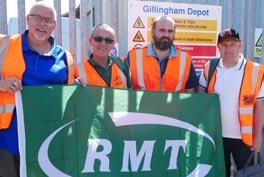
who, although a little surprised to see us, were quite friendly.
Medway branch chair Paul Dennis said that being part of a union wasn’t just paying your dues and voting for officers every couple of years.
“It is about committing to stand with friends and colleagues at work, whenever called upon and standing behind our reps and officers when the employers, the government or the media pick a fight with us,” he said.
As well as the great work put in by all, John Parsons met up with recently retired member Colin Benham and
presented him with his 40-year badge and medallion.
Colin said that he never regretted joining the NUR back in the day as it gave him peace of mind, a sense of camaraderie and a voice when it came to workplace issues and pay negotiations.
John Parsons said that it was an honour to present the medallion and badge on behalf of the general secretary and the union.
“40 years is a significant milestone in membership and service and Colin deserves to be recognised for his solidarity and commitment,” he said.


Dear editor,
I am a ‘Camp boss/ Chef manager’ working offshore in the UK energy sector. I place my job title in inverted commas and italics as it is a catch-all term.
Over the years, offshore catering companies have become Olympians in the race to the bottom, cutting catering numbers and removing supervisory positions.
The myriad of tasks and responsibilities that these now ‘redundant’ roles comprised of have been shifted onto the catch all position that is the ‘camp boss’ circa 2024.
So, what I am in my world of work is an administrator, accountant, store man, stock controller, food safety specialist, food intolerance /food allergy gatekeeper, nutritionist, educator, dietitian, wellness and mental health support, craftsman, instructor, mentor, trainer, competency verifier, health and safety professional, accommodation lead, waste control and recycling, shop keeper and mediator.
These are some of many and varied hats that make up the basket that is a Chef manager offshore in 2024. The COTA companies driven by the ever present need to do it cheaper have streamlined the personnel, promised to do more with less for less but still somehow better. Ultimately these promises have translated into the evermushrooming remit of Chef managers.
The much-heralded COTA agreement does not cover the no-mans land that is the Camp boss role. In an ironic twist its far easier to add additional duties to the Chef manager than it is to add them to the various grades, as over the years, the grades remit has to be honed and pruned to reflect the core tasks and these are clearly noted in the COTA job descriptions for these roles. Few grade D chefs aspire to the chef manager role because they see the unpaid additional hours, the constant and unremitting pressure that has been heaped upon the chef manager role. The indignity of ‘customer comment
cards’, the need to make budgets, keep the customers happy, no waste and no accidents, my fellow Chef managers will understand these things. In a multi-billion pound industry, the Daily budget per person to provide sustenance is farcical. I would like to encourage all the chef managers who do read this to consider the question of worth.
Do you feel that your role as a head of a key department is respected, do you feel that you are given the resources and support to fulfill such a pivotal role in the life and well-being of a remote workplace?
Do you feel that your salary reflects the job you do? For myself, the answer is NO. If I am doing the job of a head of a department I want to be paid as such. Please take the time to contact our union and say enough is enough. Chef managers KNOW YOUR WORTH.


With household finances un
f work.
your
Over 68,000 RMT members have benefited from membership services which offer a variety of savings, as well as legal and financial support from our trusted partners.
Members are benefiting from cashback on their everyday shopping, exclusive car and home insurance rates, as well as protection policies designed with union members and their families in mind. Your family can benefit too!†



Union Rewards provides cashback and discounts from hundreds of online retailers. Access to Union Rewards is free to RMT members and includes a £10 Welcome Bonus for you.
RMTRewards.com
Don’t miss out on your RMT membership entitlement. Register for your FREE £5,000 Accidental Death Cover today:
Compare quotes online to see how much you could save on your car insurance. PLUS don’t miss out on their Price Match Guarantee - if you find a cheaper car insurance quote online, just call 0330 022 6657 and RMTCar guarantee to beat it!
RMTCar.co.uk EARN CASHBACK ON YOUR INTERNET SHOPPING
Earn up to 8% cashback on your
shopping with the RMT Prepaid Plus Cashback card!
With an expert panel of insurers, the home insurance comparison offers a discount for RMT members and searches for the best deals to suit your needs.
PLUS - get a quote before 30th November to be entered into our £2,000 prize draw!
RMTProtect.com/Home
Pays you a monthly tax-free income which can be used to pay your bills, your mortgage or your rent in the event you are unable to work due to an accident or sickness. RMTProtect.com/Income
Life Insurance provides a cash lump sum payout when you die, money to help support your loved ones at a very difficult time. Key features of RMT life cover include:
acceptance
• Better pay with reduced hours • Protecting pensions
Defending jobs and conditions
More rights at work
Improved health and safety

Ballot papersmust bereturned by 21st October








